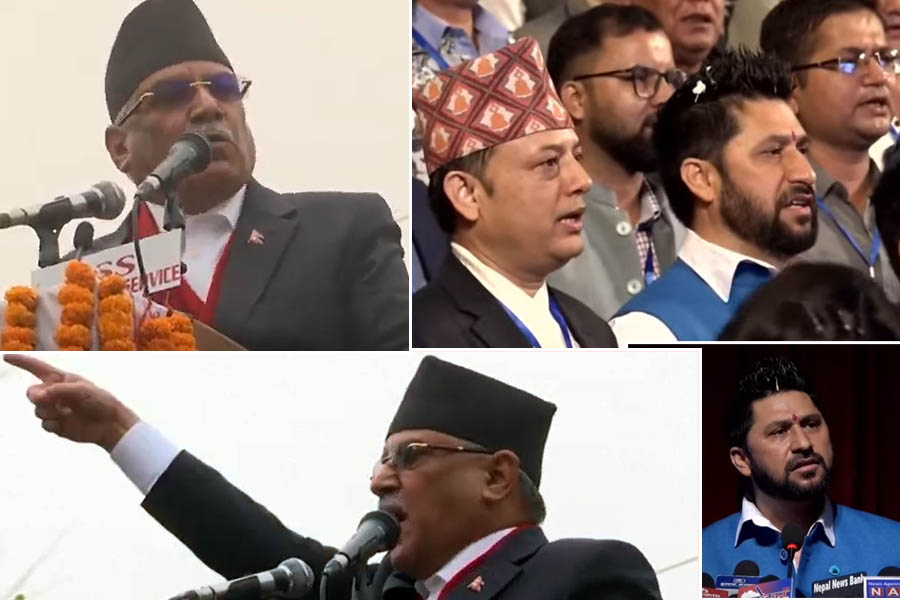
As Nepal's political dynamics shift, a new and intriguing alliance seems to be taking shape between the Maoist Center and the Rastriya Swatantra Party (RSP). Both parties, now in the opposition, are aligning on shared concerns about governance, corruption, and the needs of the people, with a focus on holding the ruling coalition accountable. This collaboration comes at a time when the Congress-UML alliance is being criticized for its attempts to dominate Nepal's political landscape, sparking both parliamentary and street-level protests from the opposition.
The Maoist-RSP Coalition: A Joint Strategy for Accountability
The Maoist Center, led by Pushpa Kamal Dahal, has long advocated for anti-corruption and people-first policies. In the second week of August, the Maoist Standing Committee decided to cooperate with any parties that share common views, particularly focusing on good governance. Similarly, the RSP, under Ravi Lamichhane, has emphasized the need for collaboration on key issues rather than forming broad electoral alliances. This new partnership between the two parties suggests a strong push against the status quo.
Maoist Deputy General Secretary Shakti Basnet articulated that the cooperation with the RSP stems from similar views on anti-corruption and governance. RSP Deputy Chairman Swarnim Wagle echoed this sentiment, stating that their focus is on warning against the wrongdoings of the ruling Congress-UML alliance.
Both parties have indicated a willingness to take their protests from Parliament to the streets. Lamichhane, addressing his party's national meeting, emphasized the need to be ready for "house to street" movements, indicating a preparedness for larger protests should the government continue its perceived missteps. The Maoists and RSP have already coordinated on key parliamentary actions, such as their joint stance during attempts to remove Deputy Speaker for misconduct.
A Challenge to the Ruling Congress-UML Alliance
The Congress-UML partnership, which dominates Nepal’s political arena, is increasingly seen as moving the country towards a two-party system. This power dynamic has not only alienated opposition groups but also drawn sharp criticism from within the ruling parties. Congress Chairman Sher Bahadur Deuba, while unveiling a painting of BP Koirala in Kavre, acknowledged the frustrations within his party. He highlighted the complaints that Congress “gossips more and does not work,” urging his party to focus on delivering results to the people.
Nepali Congress leadear and one of the deginated central member Bishwa Prakash Sharma also touched on the need for constitutional amendments to ensure greater political stability. Sharma proposed that in future elections, only the party with the most popular votes should govern, preventing the second or third largest parties from forming coalitions to seize power. This reflects a growing call for reforms that would streamline governance and reduce political instability.
Vidya Bhandari’s Support for UML: A Bid for Dominance in 2084
Amidst these political shifts, former President Vidya Devi Bhandari made a powerful statement at the Madan Bhandari Foundation, expressing her desire for the CPN-UML to dominate in the upcoming 2084 elections. She envisions UML holding all the key posts—President, Prime Minister, Speaker—establishing the party as the country’s decisive political force.
Bhandari's statement underscores the broader competition between the country's political blocs. Her wishes for the UML’s dominance reflect a clear intention to challenge the Maoist-RSP coalition, which poses a serious threat to the Congress-UML political hegemony.
Cooperation and Conflict on the Horizon
The Maoist-RSP partnership is still in its early stages, but both parties have signaled that their cooperation could intensify in the coming parliamentary sessions. While the Maoist Center aims for broader polarization with left-leaning parties, as decided in their August Standing Committee meeting, the RSP remains focused on issue-based alliances without committing to an electoral partnership.
Lamichhane’s national political report points out that while conflict with the government on issues like nationalism and livelihoods is inevitable, cooperation is necessary to prevent what they see as manipulation and distortion by the ruling Congress-UML coalition. His refusal to commit to electoral alliances shows the RSP’s strategy of preserving its independent identity while working closely with like-minded opposition forces.
Navigating a Complex Political Future
As Nepal heads towards its next elections, the country's political landscape is rapidly evolving. The Congress-UML alliance is determined to maintain its grip on power, while the Maoist-RSP collaboration is growing stronger both within and outside the walls of Parliament. With figures like Sharma pushing for constitutional changes to stabilize the political system and Bhandari calling for UML's dominance, the competition for control of Nepal’s future is fierce.
While the alliance between the Maoists and the RSP is focused on anti-corruption and governance, there is an underlying tension between cooperation and competition. Whether these parties can sustain their issue-based alliance in the long term or fall back into the polarized patterns of Nepal’s past remains to be seen. What is certain is that Nepal’s political scene is entering a new chapter, one shaped by both cooperation and conflict as the country grapples with its future.
#NepalPolitics 🇳🇵 #MaoistRSPAlliance ✊ #Elections2084 🗳️ #AntiCorruption 💼 #PoliticalReform 📜 #CongressUMLConflict 🔄 #GovernanceMatters 🏛️ #StreetProtests 📣
Thank you for reading: globalpostheadline.com





